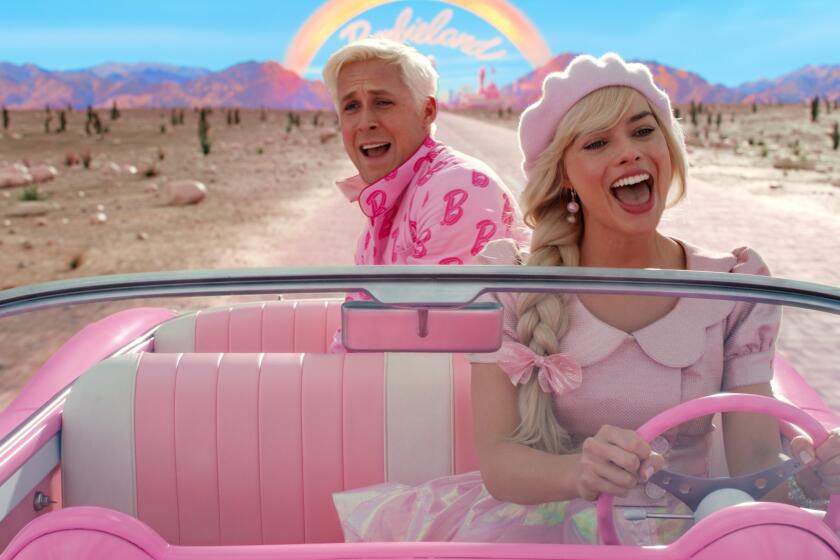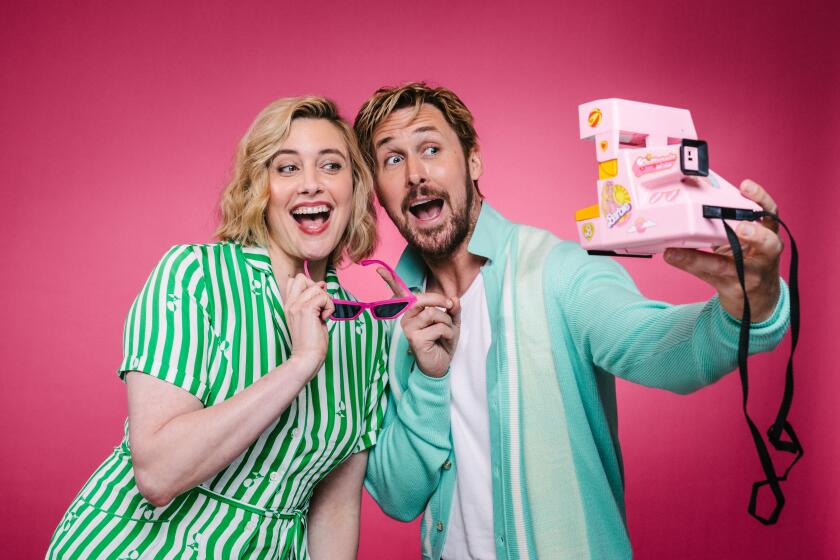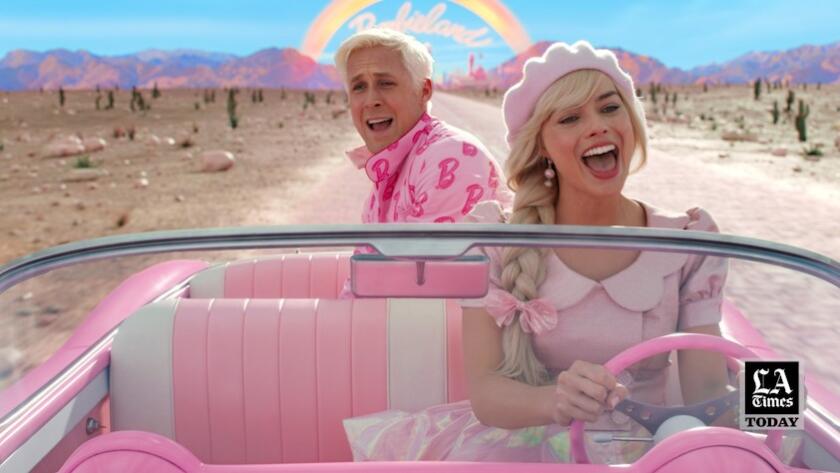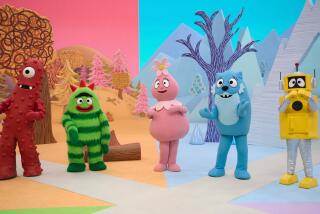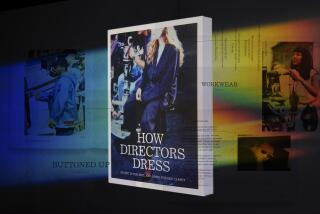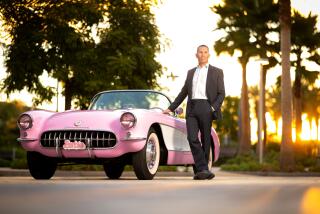Review: With Robbie in pink and Gosling in mink, ‘Barbie’ (wink-wink) will make you think
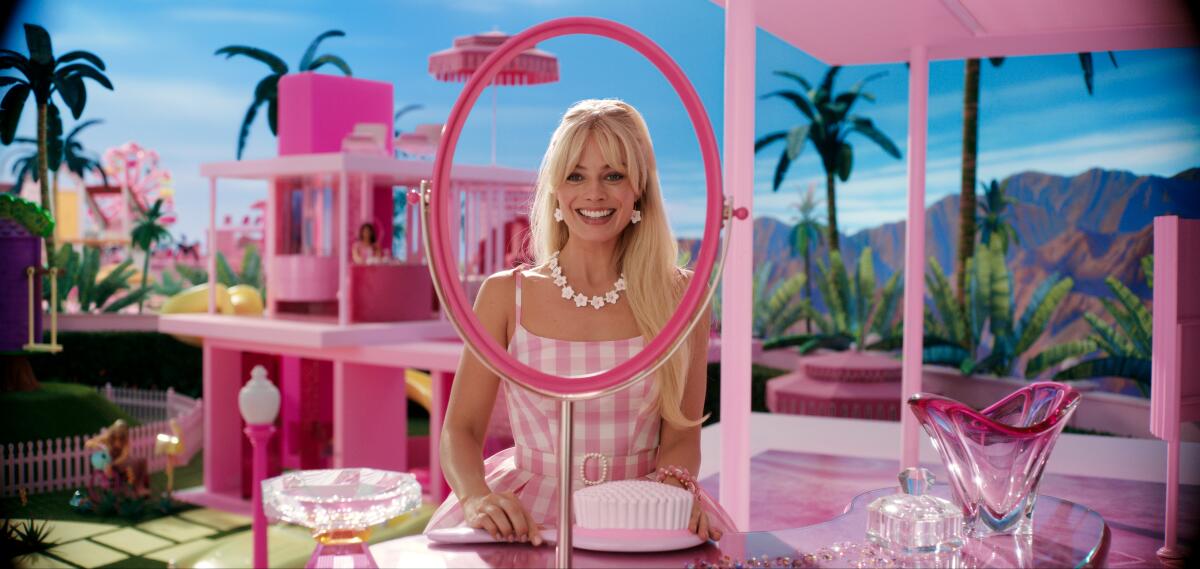
Greta Gerwig’s “Barbie,” an exuberant, sometimes exhaustingly clever piece of Mattelian neorealism, opens with an extended, heavily trailer-spoiled homage to “2001: A Space Odyssey.” We’re at a drab early moment in the history of the toy industry; for too long, little girls everywhere have had only their sad, uninspiring baby dolls to play with — until now, at this fateful dawn-of-mannequin moment. Hello, dolly! But really, hello, Barbie, played by Margot Robbie with a megawatt grin and impeccable coiffure, modeling a black-and-white swimsuit and towering over the primordial landscape on skyscraper legs. She’s a marvel of (anatomically incorrect) engineering, a citadel of plasticine perfection and, to judge by her immense popularity, a major evolutionary leap forward.
Whether or not Barbie has ever represented an advance, of course, has been fiercely debated since Ruth Handler created her in 1959. Did Barbie, with her can-do spirit and variegated career possibilities, offer young girls a positive model of be-whatever-you-want-to-be womanhood? Or did her bombshell proportions and impossible chest-to-waist ratio entrench the kinds of cruelly unforgiving beauty standards that second-wave feminism was just beginning to interrogate?
Decades later, conversations around female self-image, representation, agency and empowerment have shifted, to say the least, as have personal and public attitudes toward Barbie herself. She has been attacked and defended, dismissed as a punchline and reclaimed as a pioneer. She has diversified with the times (new races, new body types and, as always, new clothes). In recent years, she’s also experienced plummeting sales and a diminished cultural profile, which of course explains why — after countless small-screen animated Barbie movies, series and specials — she now has a live-action theatrical feature to call her own.
Looking at her history and evolution, Barbie is clearly a strong, independent woman — the sort advocated by all four waves of feminism.
Really, though, that explains this movie only in part. Whatever you think of “Barbie,” the mere existence of this smart, funny, conceptually playful, sartorially dazzling comic fantasy speaks to the irreverent wit and meta-critical sensibility of its director. (It also owes something, I suppose, to Mattel’s willingness to endure some modestly scathing satire in the pursuit of ever-greater profits.) Working again with her co-writer, Noah Baumbach (“Mistress America,” “Frances Ha”), Gerwig has conceived “Barbie” as a bubble-gum emulsion of silliness and sophistication, a picture that both promotes and deconstructs its own brand. It doesn’t just mean to renew the endless “Barbie: good or bad?” debate. It wants to enact that debate, to vigorously argue both positions for the better part of two fast-moving, furiously multitasking hours.
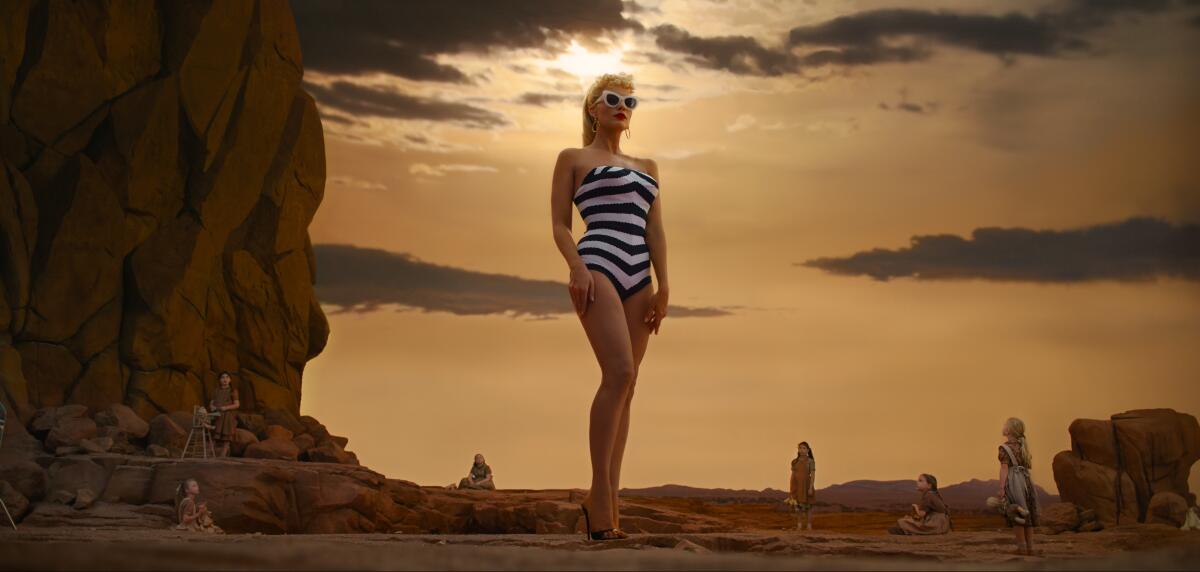
The case for the Barbie defense is presented by the Barbies themselves. There are a lot of them walking, talking, dancing, doing the splits and consuming nonexistent meals in the groovy pinktacular paradise that is Barbie Land, where life is a beach party by day and a dance party by night. The Barbies dwell in sisterly harmony and blissful self-fulfillment, each with her own meticulously furnished Barbie Dreamhouse and endlessly colorful wardrobe. Each one also has her role to play, whether she’s President Barbie (Issa Rae), Dr. Barbie (Hari Nef), Writer Barbie (Alexandra Shipp), Lawyer Barbie (Sharon Rooney) or even Mermaid Barbie (Dua Lipa), popping up from behind some delightfully fake-looking ocean waves. (If you’ll permit a “Barbenheimer” joke, I must point out the existence of Emma Mackey as Physicist Barbie, who presumably discovered the secrets of nuclear fuchsian.)
Tiptoeing into the spotlight on perfectly arched feet is Robbie as Stereotypical Barbie, whose self-mocking name and lead-heroine status are a handy example of Gerwig’s have-it-both-ways attitude. Although surrounded by Barbies (and Kens, but more on them later) of various shapes, sizes and colors, Stereotypical Barbie is Barbie: white, blond and svelte, in line with our earliest, most lasting impressions of the doll formally named Barbara Millicent Roberts. To say that Robbie is perfectly cast is an understatement (her surname alone could be a Barbie/Roberts portmanteau), though that very perfection underscores the movie’s problem: Can you really call out and perpetuate a stereotype at the same time? Would it have been better — more daring, and also more interesting — to tell the story from a less classically molded Barbie’s perspective?
Perhaps that possibility will be taken up in future visits to what is already being mapped out as a full-blown Mattel cinematic universe. For now, this early adventure generates more than enough goodwill to sustain your curiosity and suspend, or at least temporarily overwhelm, your reservations. Drawing on the breathless narrative velocity and sly comic mischief she showed in her sparkling recent adaptation of “Little Women,” Gerwig maintains a delirious but remarkably coherent onslaught of gags, twists, ideas, non sequiturs (Michael Cera! Matchbox 20!) and scholarly bits of Barbie arcana — all of it swirling like a merry comic tornado around the serene center of gravity that is Robbie’s captivatingly sincere performance.
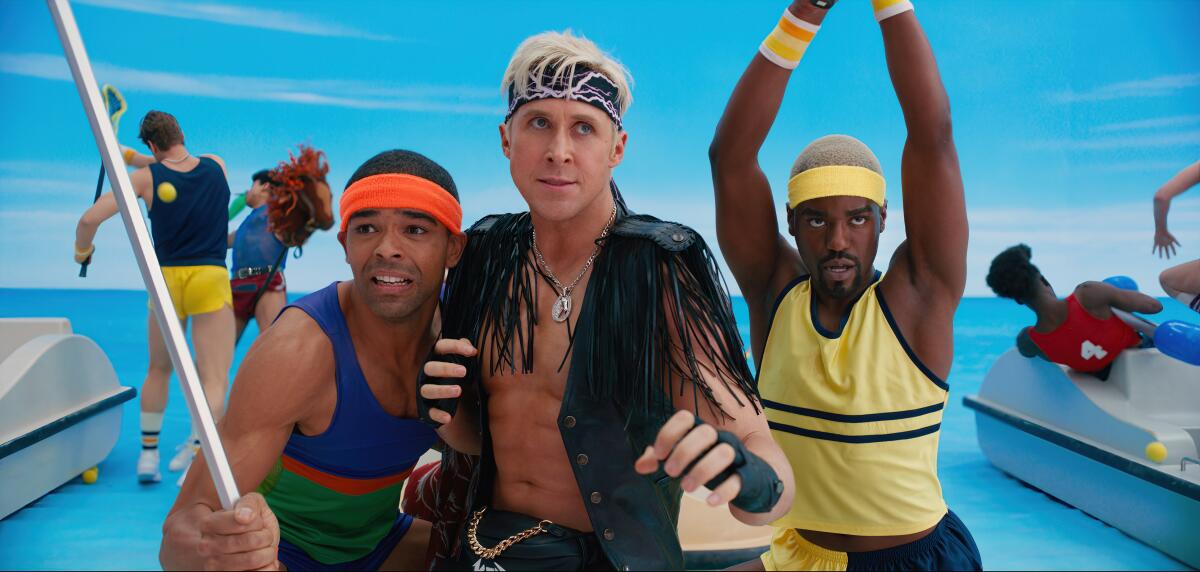
Like Amy Adams as a fish-out-of-water Disney princess in “Enchanted,” Robbie takes an archetype long dismissed as an airheaded caricature and, moment by deeply felt moment, teases and fleshes her out. With her radiant smiles and goofy-graceful physicality, she inhabits Barbie’s glamour and entitlement as effortlessly as she inhabits her hot-pink bell bottoms. But she also gradually punctures those upbeat vibes with tremulous notes of vulnerability and premonitions of disaster, right around the time her Barbie notices a patch of cellulite and begins having incongruous thoughts of death.
These intimations of mortality, which I wouldn’t have minded hearing about in even gnarlier detail, suggest cracks in Barbie’s psyche, but also in Barbie Land’s very foundations. To explain further would risk giving away the strange metaphysical rules that govern Barbie Land, its fantastic-plastic inhabitants and their tricky relationship to the real world. And that real world is ultimately Barbie’s destination, a place she sets out for in search of answers, not realizing that her own attention-starved Ken has stowed away in her little pink Corvette.
Ah yes, Ken. There are several Kens in this movie, all of them amiable second-class citizen hunks of Barbie Land, played by actors including Simu Liu, Kingsley Ben-Adir, Scott Evans and Ncuti Gatwa. But Gosling, as the neediest, most pathetically insecure Ken of the lot, rises to delicious new levels of actorly self-mockery. Sporting a platinum dye job that never fails to match his denim cutoffs, ’90s neon workout gear, pastel-striped beachwear and luxurious mink coat (sold separately), Gosling scores the expected laughs about Ken’s fashionista vanity, ambiguous sexuality and all-around preening petulance. But what makes him more than just another smooth-chested punchline is one of Gerwig’s deftest satirical touches: As it turns out, it doesn’t take long for a dude with serious self-esteem issues to open a Pandora’s box of patriarchal oppression.
Star Ryan Gosling and director Greta Gerwig open up about Ken’s journey to toxic masculinity and back in their comedy based on the iconic Mattel toys.
For toxic masculinity, though unheard of in Barbie Land, is of course alive and well in the real world, as Barbie and Ken are initially shocked to learn when they arrive on the sunny streets of Los Angeles. Here, women aren’t respected, let alone placed on polymer pedestals; they’re ogled, objectified, sidelined and worse. And to hear it from an angry teenager named Sasha (Ariana Greenblatt), Barbie herself deserves her share of the blame, being a tool of “sexualized capitalism” that “set the feminist movement back years.”
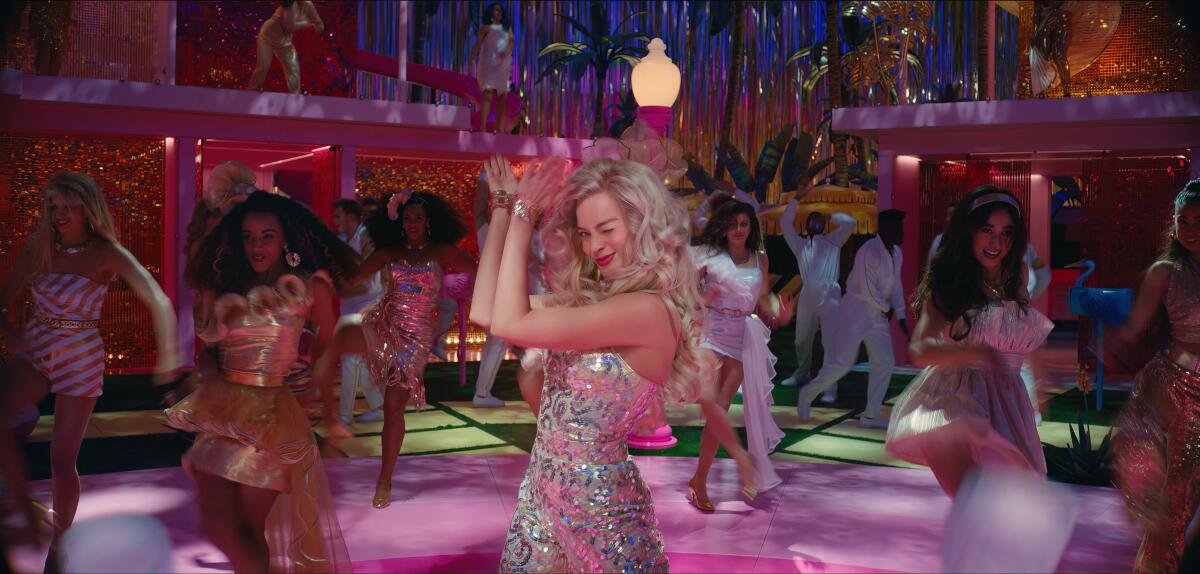
That’s the case for the Barbie prosecution, in a nutshell, and as you might expect, it isn’t allowed to go unchallenged. Sasha’s attack is the first of the script’s two big throw-down scenes; the second is a rousing feminist cri de coeur delivered by Sasha’s mom, Gloria (a winning America Ferrera), who’s on hand to temper her daughter’s scorn, emphasize Barbie’s enduring multigenerational appeal and remind us that, yes, you can love women and love Barbie too. It’s a hugely effective monologue, calculated for maximum applause and likely to get it. But “Barbie’s” feminism, something it wears proudly on its sequined sleeve, seldom needs such emphatic dramatic underlining to register.
The movie is at its best when it’s simply leaning into its own fast, funny, free-floating goofiness, whether it’s letting Kate McKinnon do her thing as a self-explanatory Weird Barbie, pitting multiple dancing Kens against each other in a hypnotic dream ballet, or throwing in a coconutty reference to “Monty Python and the Holy Grail.” I could’ve done without the filler-ish comic subplot featuring Will Ferrell as Mattel’s CEO, a mostly toothless bit of corporate ribbing that nonetheless does lead to a visually striking chase sequence through a maze of office cubicles, cleverly staged as a riff on Jacques Tati’s classic “Playtime.”
Gerwig’s wide-ranging movie love serves her well here; there’s something fitting and finally moving about the way Barbie’s journey of self-discovery takes her through a glittery funhouse of cinematic allusions. If Barbie Land can’t help but evoke the creepily self-contained utopia of “The Truman Show,” Barbie’s entire quest unfolds like a kind of reverse “Wizard of Oz,” in which she ends up leaving a trippy Technicolor dreamscape and traveling to a humdrum, grayed-out reality rather than the other way around. You might sense echoes of those films during this movie’s strange, beguiling final moments, and perhaps a callback to “2001” too. The evolution of Barbie continues.
'Barbie'
Rating: PG-13, for suggestive references and brief language
Running time: 1 hour, 54 minutes
Playing: Starts July 21 in general release
Watch L.A. Times Today at 7 p.m. on Spectrum News 1 on Channel 1 or live stream on the Spectrum News App. Palos Verdes Peninsula and Orange County viewers can watch on Cox Systems on channel 99.
More to Read
Only good movies
Get the Indie Focus newsletter, Mark Olsen's weekly guide to the world of cinema.
You may occasionally receive promotional content from the Los Angeles Times.
